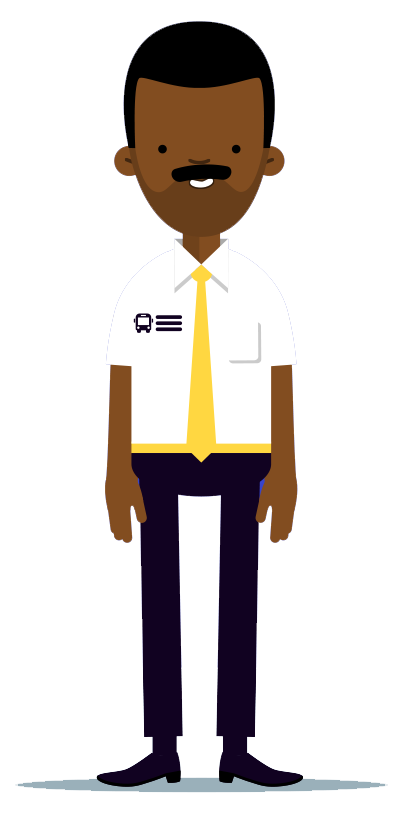If you’re a
bus driver it pays
to learn what you
can claim
To claim a deduction for work‑related expenses:
• you must have spent the money yourself and weren’t reimbursed
• it must directly relate to earning your income
• you must have a record to prove it.*

You can only claim the work‑related portion of an expense.
You can’t claim a deduction for any part of an expense that does not directly relate to earning your income.
* You can use the myDeductions tool in the ATO app to keep track of your expenses and receipts throughout the year.
Car Expenses
You can’t claim the cost of normal trips between home and work, even if you live a long way from your usual workplace, work split shifts or have to work outside normal business hours.
You can claim the cost of using a car you own when you drive:
- directly between separate jobs on the same day – for example, finishing your morning bus shift and driving to your second job in administration
- to and from an alternate workplace for the same employer on the same day – for example, travelling between different depots for the same company.
Travel Expenses
You can claim travel expenses if you travel away from your home overnight in the course of performing your employment duties. For example, driving a two‑day bus tour group from Newcastle to Canberra where you are required to sleep away from your home overnight. Travel expenses can include meals, accommodation,
fares and incidental expenses you incur when travelling for work.
You can’t claim a deduction if the travel is paid for, or you are reimbursed by your employer or another person.
Receiving a travel allowance from your employer does not automatically entitle you to a deduction. You still need to show that you were away overnight, you spent the money, and the travel directly relates to earning your employment income.
Clothing and Laundry Expenses
(incl footwear)
With a few exceptions, clothing can’t be deducted as a work‑related expense.
You can’t claim the cost to buy, hire, repair or clean conventional clothing you wear for work, even if your employer requires you to wear it and you only wear these items of clothing at work. ‘Conventional clothing’ is everyday clothing worn by people – for example, for example, black pants and collared shirts.
You can claim the cost of buying, hiring, repairing or cleaning clothing if it is considered:
- protective – clothing which has protective features or functions that you wear to protect you from specific risks of injury or illness at work. For example, steel‑capped boots or hi‑vis vests
- a compulsory uniform – clothing you are explicitly required to wear by a workplace agreement or policy, which is strictly and consistently enforced, and is sufficiently distinctive to your organisation. For example, an embroidered shirt with your employer’s logo that is compulsory for you to wear at work
- non‑compulsory uniforms that are registered with AusIndustry (check with your employer if you’re not sure).
You can’t claim a deduction if your employer pays for or reimburses you for these expenses.
Driver’s licence
You can’t claim the cost of getting or renewing your driver’s licence, even if it is a condition of your employment. This is a private expense.
You can’t claim the initial cost of getting a special licence or condition on your licence to get a job as a bus driver.
You can claim the additional costs to renew a special licence or condition on your licence in order to perform your employment duties. For example, a heavy vehicle permit.
Compulsory assessments
You can claim compulsory assessments and medical examinations you require to carry out your current employment duties. For example, working with children checks.
You can’t claim compulsory pre‑employment assessments and medical examinations you take to get employment as a bus driver.
Other Expenses
You can claim the work‑related portion of other expenses that relate to your employment, including:
- sunglasses and sunscreen where prolonged periods of sun exposure is likely while you’re performing your employment duties
- personal protective equipment you buy, such as gloves, face masks, sanitiser or anti‑bacterial spray, if your job requires close proximity with customers
- overtime meals that you buy and eat when you work overtime, if your employer paid you an overtime meal allowance under an industrial law, award or agreement for the overtime and it’s included in your assessable income
- cleaning products for the bus, if you are required to keep the bus clean and the products are not supplied by your employer – for example, anti‑bacterial products and window cleaner
- diaries and logbooks – for example, to record student behaviour or damage to vehicles
- phone and internet costs, with records showing your work‑related use
- union and professional association fees.
You can’t claim private expenses, such as music subscriptions, childcare, seat covers, flu shots and other vaccinations, even if you’re required to have them for work.
You can’t claim a deduction if the cost was met or reimbursed by your employer.
This is a general summary only.
For more information, contact us.

